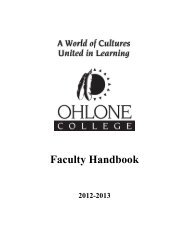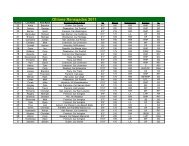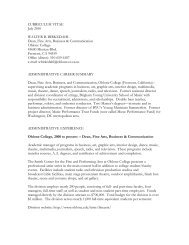2012-2013 Catalog (all pages) - Ohlone College
2012-2013 Catalog (all pages) - Ohlone College
2012-2013 Catalog (all pages) - Ohlone College
You also want an ePaper? Increase the reach of your titles
YUMPU automatically turns print PDFs into web optimized ePapers that Google loves.
250 10 POLICIES AND PROCEDURES<br />
The tables below present the SRTK rates for <strong>Ohlone</strong> <strong>College</strong> and statewide since<br />
2004.<br />
Completion Rate<br />
2004 2005 2006 2007 2008<br />
<strong>Ohlone</strong> <strong>College</strong> 25.6% 29.5% 27.7% 27.5% 28.9%<br />
Statewide 24.8% 24.1% 24.8% 24.4% 24.6%<br />
Transfer Rate<br />
2004 2005 2006 2007 2008<br />
<strong>Ohlone</strong> <strong>College</strong> 27.1% 20.4% 23.0% 17.5% 20.2%<br />
Statewide 25.1% 17.9% 16.7% 15.2% 13.8%<br />
It should be noted that the cohort used for STRK represents a very sm<strong>all</strong><br />
proportion of the students at <strong>Ohlone</strong> <strong>College</strong>. Many students attend <strong>Ohlone</strong><br />
with goals other than earning a degree or certificate or preparing to transfer to<br />
a four-year institution. In addition, the majority of <strong>Ohlone</strong> students attend on a<br />
part-time basis, thus excluding them from the STRK cohort.<br />
JEANNE CLERY ACT<br />
What is the Jeanne Clery Act?<br />
The “Jeanne Clery Disclosure of Campus Security Policy and Campus Crime<br />
Statistics Act” (formerly the Campus Security Act) is a federal law that requires<br />
institutions of higher education (colleges and universities) in the United States<br />
to disclose campus security information including crime statistics for the campus<br />
and surrounding areas. The act was first enacted by Congress in 1990 and<br />
amended in 1992, 1998, and 2000.<br />
Who is Jeanne Clery?<br />
In 1986 Jeanne Clery, a freshman at Pennsylvania’s Lehigh University, was<br />
murdered and sexu<strong>all</strong>y assaulted in her campus residence h<strong>all</strong> room by another<br />
student she didn’t know. Her school hadn’t informed students about 38 violent<br />
crimes on campus in the three years preceding her murder. Clery’s parents,<br />
Connie and Howard, led the crusade to enact the original Campus Security Act.<br />
In 1998, Congress form<strong>all</strong>y named the law in memory of Jeanne Clery.<br />
Which schools must comply with the Clery Act?<br />
All institutions of postsecondary education, both public and private, that participate<br />
in federal student aid programs must publish and disseminate an annual campus<br />
security report as well as make timely warnings of any criminal activities.<br />
What does a school have to disclose under the Clery Act?<br />
Schools must publish and disseminate an Annual Campus Security Report<br />
containing various security policies and three years worth of crime statistics.<br />
They must also issue timely warnings about crimes that pose an ongoing<br />
danger. Schools with a police or security department of any kind must also<br />
maintain a public crime log of <strong>all</strong> crimes reported to that department.<br />
The Annual Campus Security Report is published and disseminated on or<br />
before October 1 each each. The Annual Campus Security Report is available<br />
online at www.ohlone.edu/org/security. Students, staff, and the general public<br />
may obtain a printed copy by contacting campus police services in building 20<br />
on the Fremont campus.<br />
Who is entitled to receive information under the Clery Act?<br />
Currently enrolled students and employees are to receive a school’s annual<br />
campus security report automatic<strong>all</strong>y. Prospective students and employees are<br />
to be provided with information about the report and entitled to request a copy.<br />
The general public, including parents and the news media, have access to the<br />
public crime log as well.<br />
Does a school have to submit their annual crime statistics to the Department of<br />
Education (DOE)?<br />
Yes, they do. Schools have to report their crime statistics to the DOE through a<br />
speci<strong>all</strong>y designed Web site.<br />
Do school officials other than law enforcement have reporting obligations under<br />
the Clery Act?<br />
Yes, they do. All institutional officials with significant responsibility for campus<br />
and student activities have reporting obligations under the Clery Act. A school<br />
should have a policy for surveying these officials each year to determine if any<br />
of the covered crimes were reported to them. Only professional mental health<br />
and pastoral counselors are exempt from reporting.<br />
Are schools required to include crimes reported to local police agencies?<br />
Schools are required to “make a reasonable, good-faith effort to obtain statistics<br />
from outside” law enforcement agencies for inclusion in their annual report for<br />
<strong>all</strong> geographic areas including the main campus.<br />
Does someone have to be convicted of a crime before it is reportable under the<br />
Clery Act?<br />
Not necessarily. Convictions are not required under either the Clery Act or the<br />
FBI Uniform Crime Report (UCR) program for a crime to be reportable.<br />
Who enforces the Jeanne Clery Act and what are the penalties for<br />
noncompliance?<br />
The United States Department of Education is charged with enforcing the<br />
Jeanne Clery Act and may level civil penalties against institutions of higher<br />
education up to $27,500 per violation or may suspend them from participating<br />
in federal student financial aid programs. Complaints of violations should be<br />
filed with DOE regional offices.<br />
Do schools have to add arson and manslaughter, as well as a geographic<br />
breakdown to their annual crime statistics?<br />
Yes, they do.<br />
What is the difference between FBI’s Uniform Crime Reporting (UCR) program<br />
and the Clery Act?<br />
There are several key differences between how crime statistics are reported<br />
under the UCR program and the Clery Act. The UCR program is a voluntary<br />
program where law enforcement agencies submit monthly reports, while<br />
reporting under the Clery Act is mandatory and not limited to crimes reported<br />
to law enforcement. Addition<strong>all</strong>y, some reporting categories are different,<br />
specific<strong>all</strong>y simple theft is not included and the definition of sexual assault is<br />
broader under the Clery Act.<br />
Does the Clery Act follow the guidelines established in the UCR program?<br />
Where guidance from the UCR program does not conflict with Clery Act<br />
reporting requirements schools are expected to follow the classifying and<br />
scoring methods outlined in the FBI UCR Handbook.<br />
If more than one crime occurs in the same incident, which offense is reported?<br />
Under a UCR standard known as the “hierarchy rule” only the most serious<br />
(using the order found in the UCR Handbook) incident is to be reported in<br />
annual crime statistics. The crime log and timely warnings may reflect more than<br />
one crime.<br />
AUTHORITY FOR LAW ENFORCEMENT<br />
Campus Police Officers are granted authority to act as Police Officers by<br />
830.32(a) of the Penal Code and 72330 of the Education Code. Campus<br />
Security Officers act as non-sworn officers only and do not have police powers.<br />
They take crime reports and reports of minor auto accidents, write parking<br />
citations, patrol the campus (on foot and in vehicles), and observe and report<br />
any unusual conditions or circumstances.<br />
All officers working on campus (sworn and non-sworn) are required by law to<br />
attend the 832.2 P.C. School Peace Officers course or School Security Guard<br />
Course as required by the Peace Officer Standards and Training and the<br />
Department of Consumer Affairs.<br />
Sufficient equipment, along with Post-trained and non-Post-trained personnel,<br />
sh<strong>all</strong> be maintained to accomplish Campus Police Services’ assigned<br />
responsibility of seven-day-a-week coverage of facilities owned, operated, or<br />
under the control of the <strong>Ohlone</strong> Community <strong>College</strong> District.<br />
<strong>2012</strong>-<strong>2013</strong> OHLONE COLLEGE CATALOG

















